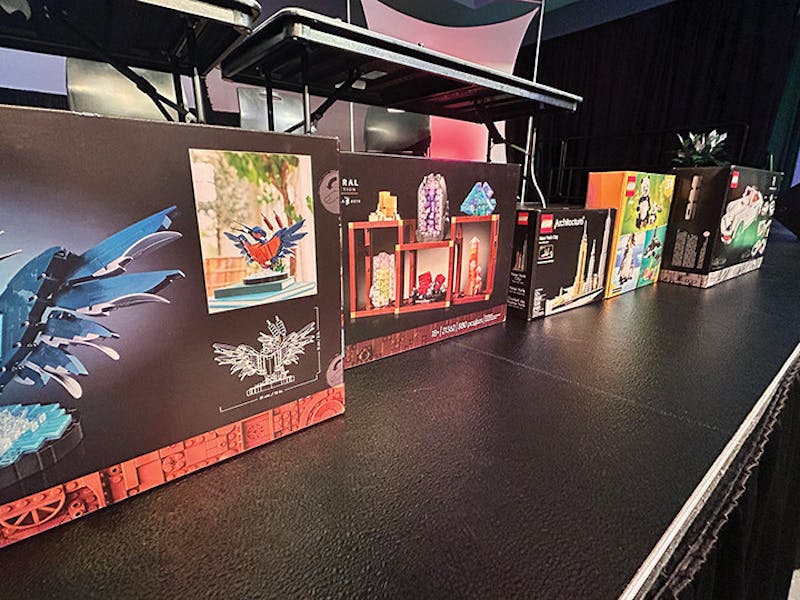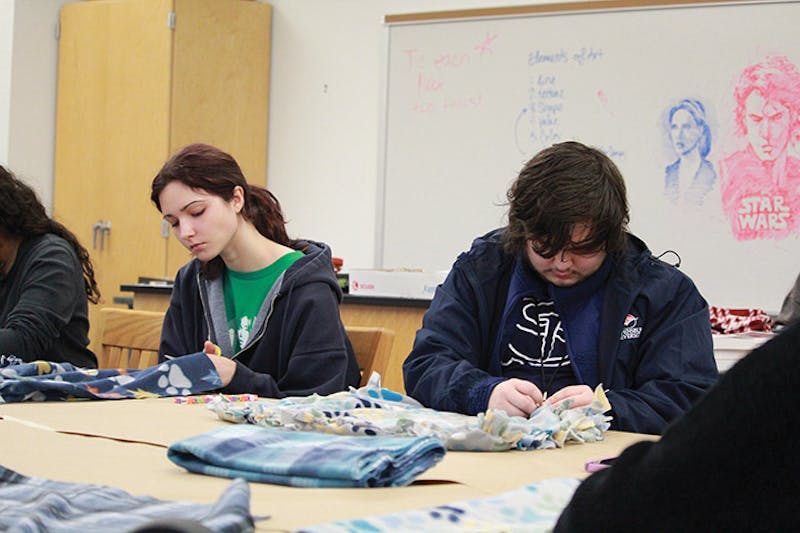
Cristina Rhodes does not hate white people. She also does not think men and capitalism are at the root of all evil.
Rhodes has been accused of both those things – and many other colorful aspirations – in anonymous class evaluations since arriving at Shippensburg University in 2019 by way of Virginia and Texas. Rhodes teaches a variety of English courses but focuses several, specifically Literature and Society, on banned books in various literary genres.
In this tumultuous political climate, the topic of banned books is far from comfortable for many of Rhodes’ students. But despite walking into her classroom with a black face mask, emotional support water bottle and venti (on a good day) hot tea in hand, Rhodes is not there to be comfortable.
“I don't want people to completely change their minds,” Rhodes said, sitting crisscross in her moderately cluttered office on an unseasonably warm February afternoon. “I want people to sit with discomfort. It serves a purpose to have students sit with discomfort, both educationally and socially.
Banned books have existed as long as literature itself, but Rhodes’ educational and professional development in the politically chaotic 2010s sparked her desire to explain to students why so much literature is under attack.
“I think that oftentimes, people view literature as sort of this like apolitical thing of enjoyment, or you know, escapism – but literature cannot be apolitical,” Rhodes said. “When they're discussed as banned books, there's always a question of, ‘Oh, is there something nefarious in them? Is there something we shouldn't be reading?’ And it's like, oh, no, it's a person of color. That's what we shouldn't be reading. And so I think if we can look at these books, it helps to sort of broaden people's scope."
Part of broadening the scope of thinking is by Rhodes incorporating hot-button concepts like toxic masculinity and wokeness into her courses and attempting to remove the soundbite nature of it all.
“My pedagogy and teaching values are centered around equity and making sure that students feel that their lives and experiences are valuable,” Rhodes said. “And so I suppose in those ways, right, that the wokeness is there. All I can ask our students is that they think critically about things.”
Teaching banned books also allows Rhodes to show students of color representations of themselves in literature, an experience she lived as a Mexican American growing up in Virginia in the 1990s. Other than the Josefina series of American Girl Doll books, “there were not books about Mexican Americans,” Rhodes said.
In the fall of 2016, Rhodes was working as a graduate teaching assistant in Texas in a developmental writing course with primarily students of color. When the presidential race concluded in the middle of the semester, Rhodes had an interaction with one of her students that has shaped her teaching philosophy since.
“I remember one of my students asking if they would be safe, and I didn't have a good answer,” Rhodes said with a twinge of emotion in her throat. “I cannot keep my students physically safe. I mean, I can try the very best that I can. But I mean, I'm like five foot one, it's not going to happen. But what I can do is give them knowledge and give them affirmation. Show them that they matter and that they are important, even when dominant discourse says they're not.”
Rhodes has held that ideology for over a decade and has never hesitated to speak up for underrepresented groups in educational settings. She remembers first embracing uncomfortable classroom discussions during graduate school.
“I went on a jaunt in class about feminism, and how, like, Women's and Gender Studies was an important thing. This weirdo who was always a little stuck up who’s getting grumpy [said] ‘Oh, well, why don't we have a male studies,’” Rhodes said, clearly picturing herself back in that classroom. “I was already real, just hot over things that were happening in that class [and] my like, gut instinct was to say ‘we do, it's called human history.’ He like, shut up real fast. And it was very, very gratifying. I feel like that moment is like, ingrained in my brain forever,” Rhodes said.
While Rhodes rejects educational comfortability, she is rarely seen teaching without embracing physical comfort. Students enter her classroom and instantly move desks into a horseshoe shape because, “I want students to see who they’re talking to,” Rhodes said. She sits crisscross in her swivel chair with her thermos – hot tea, but today is not a Starbucks day – and rarely goes a half hour without colorful phrases – “hockey is very gay!” – slipping into her language.
“At this point in my career, I’ve given myself license to just go with it and not really care. People tend to remember when you have an experience with a professor who is interesting. Some of it is purposeful, and some of it is just,” Rhodes pauses, rapidly questioning her academic identity, “I like to sit in chairs certain ways.”
One morning, Rhodes surveys her class on the status of several absent students and tells the group she would prefer to be notified of absences “so I don’t think you’re dead.” It sounds crazy, but within minutes, every student is accounted for. Yes, even the white people. And the men. And the capitalists.



The Slate welcomes thoughtful discussion on all of our stories, but please keep comments civil and on-topic. Read our full guidelines here.